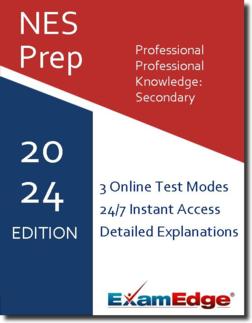NES Professional Professional Knowledge: Secondary (052) Practice Tests & Test Prep by Exam Edge - Topics
** Sample images, content may not apply to your exam **
Understanding what is on the NES Professional Knowledge: Secondary exam is crucial step in preparing for the exam. You will need to have an understanding of the testing domain (topics covered) to be sure you are studying the correct information.
- Directs your study efforts toward the most relevant areas.
- Ensures efficient and adequate preparation.
- Helps identify strengths and weaknesses.
- Allows for a focused approach to address gaps in understanding.
- Aligns your preparation with the exam's expectations.
- Increases the likelihood of success.
- Keeps you informed about your field's current demands and standards.
Not ready to purchase our complete practice tests yet? Start with a NES Assessment of Professional Knowledge Secondary FREE Practice Test first!
Understanding the exact breakdown of the NES Assessment of Professional Knowledge Secondary test will help you know what to expect and how to most effectively prepare. The NES Assessment of Professional Knowledge Secondary has 100 multiple-choice questions and 2 essay questions. The exam will be broken down into the sections below:
| NES Assessment of Professional Knowledge Secondary Exam Blueprint | ||
|---|---|---|
| Domain Name | % | Number of Questions |
| Student Development and Learning | 24% | 24 |
| Assessment, Instruction, and the Learning Environment | 40% | 40 |
| Assessment, Instruction, and the Learning Environment (Written Assignment) | 10% | 10 |
| The Professional Environment | 16% | 16 |
| The Professional Environment (Written Assignment) | 10% | 10 |
NES Assessment of Professional Knowledge Secondary - Exam Topics Sample Questions
|
|






